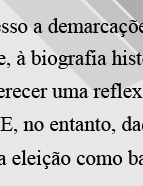

................................
At this time, T. Carlyle (1841) and R.W. Emerson (1850) had already published their major works on the role of great men ("heroes" in the former, "representative men" in the latter), while the Portuguese editions were only planned in the next century, significantly as part of the civic education programme of the Portuguese Renaissance. They had said that the history of humanity came down to the history of its great men, as indeed Luís de Magalhães himself would say in the preface to O. Martins' Perfis and several decades later, Mário Gonçalves Viana, one of the spokesmen for the Salazar regime. The logical outcome of the path followed by the voluntarist theories during the troubled period that preceded and followed the establishment of the Republic was that the Estado Novo ideology would transform the assertion into doctrine . Not without its own dose of philosophical eclecticism (Nietzsche's work on the Übermensch came out in the same year), in 1913, R.W. Emerson's Representative Men was translated under the suggestive title of Os Super-homens [The Supermen]. The path was thus paved for the new biographical wave that would occupy historians and enthusiasts for a substantial part of the 20th century. (Álvaro Ribeiro, “Apresentação”, [1956], pp.10-11; L. Magalhães, op. cit., p.ii;M.G. Viana, “Ensaio preambular”, 1944, p.17)
